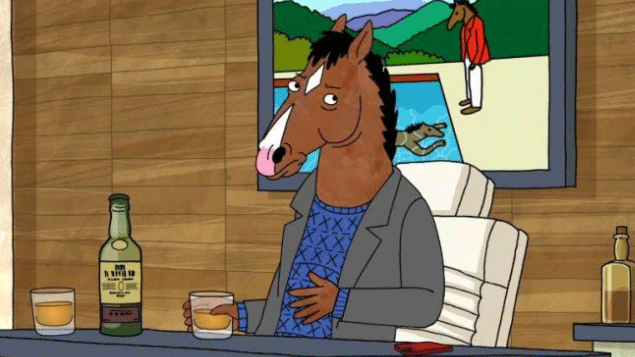By Martin Castro (Contributor) – Email
Print Edition: September 10, 2014
Bojack Horseman is one of Netflix’s rapidly increasing number of original programs. Featuring voice acting by the likes of Will Arnett as the titular character, Aaron Paul as his couch-potato roommate, and Alison Brie as his ghost writer (and, of course, love interest) Bojack Horseman details the antics of Bojack, an alcoholic, washed-out, emotionally unstable sitcom actor from the ‘90s, unable to come to grips with the fact that he is no longer relevant in pop culture. Also, he’s a horse. The world Bojack inhabits is populated by a ragtag group of walking, talking animals, along with actual people, all co-inhabiting the world as if such a thing were the most normal of occurrences.
If there’s any adjective that can be used to describe Bojack the character, it’s broken. Bojack is a self-centered egomaniac who can’t take any criticism and deals with his problems by drinking them away, or, in a more severe episode of self-loathing, a week-long binge of cocaine pills. Bojack’s emotional state is about as stable as a Jenga tower two-thirds of the way through a game. He attempts to publish a memoir by way of a ghost writer, all while reliving his glory days by watching old reruns and drinking to the point of excess.
Bojack Horseman actually manages to be a heartfelt journey into the heart and life of a severely broken person while still being ridiculously funny in an overly cynical manner. If this show has any shortcomings, they lie in the fact that it can be quite oddball at times — and while these instances are humourous and worthy of airtime, they detract from the overall emotional story arc. However, the show’s offbeat, choppy pace serves to reflect Bojack’s continuously deteriorating state of mind.
Full of gags that highlight the ridiculousness of the show’s premise, Bojack Horseman is unflinchingly bizarre in its portrayal of the human condition, and doesn’t back down from critiquing our current celebrity culture: everyone in Hollywood is an animal.
Bojack and his friends (though calling them such is a stretch) all have their time in the spotlight, partaking in various subplots and scenarios throughout the series. It seems that throughout the season we’re waiting for Bojack to grow up, to come to terms with his failed attempt at celebrity life and choose a path that will lead him to normalcy. Bojack instead chooses to pursue more and more ridiculous antics in hopes of staying relevant in the public eye. Full of insecurities and craving attention, Bojack is the product of the reality TV and gossip magazines of our world.
As the audience accompanies Bojack on his journey of self-discovery (or self-negligence), we find that, although he’s a horse, Bojack himself couldn’t possibly be any more human.



